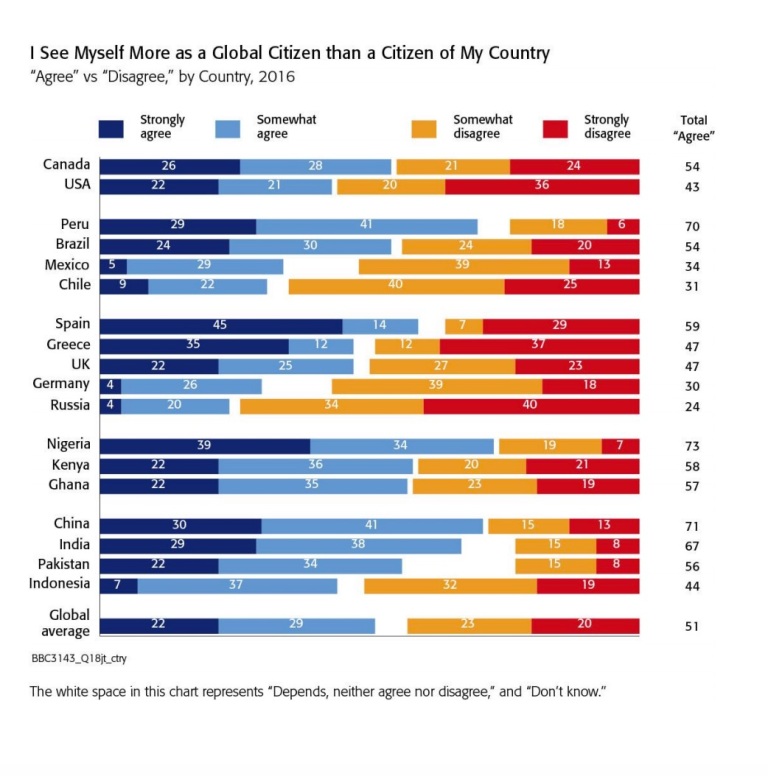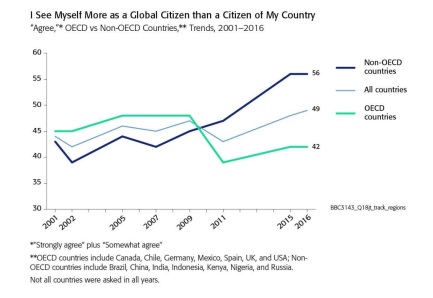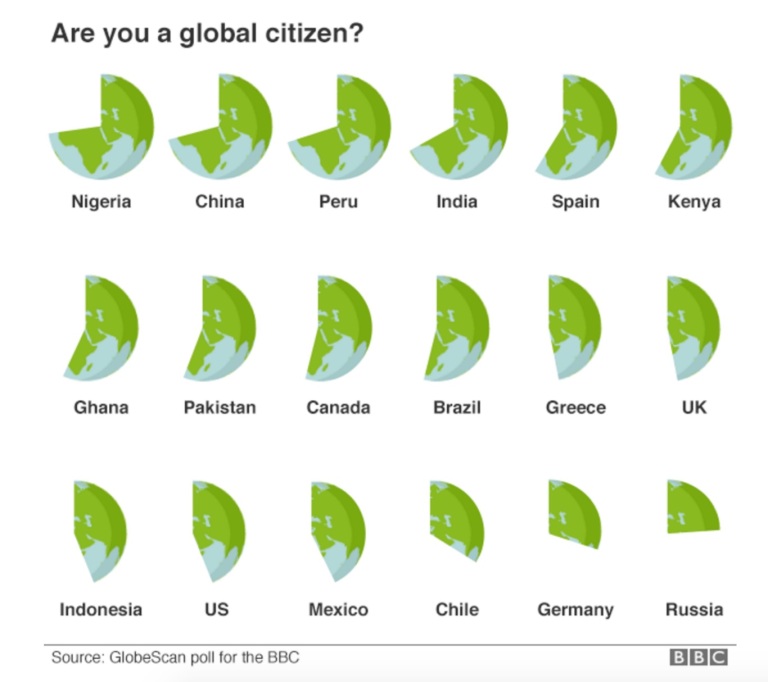Here is a question for you.
“Different people identify themselves in different ways. In your own case, would you say your most important identity is as …
01 – A member of a religious tradition
02 – A citizen of [Country]
03 – A member of your race or culture
04 – A resident of a community or area (smaller than country)
05 – A citizen of the world
VOLUNTEERED
06 – None of the above, other
99 – Don’t know / no answer”
This question is from a new poll of some 20,000 people in 19 countries, commissioned by the BBC World Service, asking this and a series of related questions. The answers suggest how recent events and trends are shaping identity around the world.
Here is a chart tabulating answers to the question above:

From GlobScan (for the BBC), Global Citizenship A Growing Sentiment Among Citizens Of Emerging Economies: Global Poll, 2016, http://www.globescan.com/news-and-analysis/press-releases/press-releases-2016/383-global-citizenship-a-growing-sentiment-among-citizens-of-emerging-economies-global-poll.html.
I think the striking numbers here are from Spain where over half identified being a global citizen over all other categories (it’s also one of the most welcoming nations in the survey to migrants), and Pakistan, which is an outlier in terms of the importance of “religious tradition.” Also curious is Indonesia, where merely 4% identified national identity as the most significant while 56% chose local community. This chart suggests identity remains diverse, despite a generation of globalization.
That said, the headline on the news piece at the BBC’s website trumpets the fact that, for the the first time, a majority (52%) of those asked identified global citizenship as more important on the individual level than national citizenship. Here is the chart for the answers to this question:

According to the BBC, “This is the first time since tracking began in 2001 that there is a global majority who leans this way, and the results in 2016 are driven by strong increases since 2015 in non-OECD countries” (the OECD includes the US and Canada, Japan, Korea, Chile, Australia, New Zealand, and many European nations). Growth in the importance of global citizenship came in “Nigeria (73%, up 13 points), China (71%, up 14 points), Peru (70%, up 27 points), and India (67%, up 13 points).” Even Pakistan, which I just identified as an outlier in the previous chart, slightly exceeds the global average at 56%.
 In the wealthier nations, however, the prominence of global citizenship is actually down since the global financial crisis at the end of the last decade. In the seven OECD nations most often tracked, a global identity fell to 39% in 2011 and now remains far below non-OECD countries.
In the wealthier nations, however, the prominence of global citizenship is actually down since the global financial crisis at the end of the last decade. In the seven OECD nations most often tracked, a global identity fell to 39% in 2011 and now remains far below non-OECD countries.
Surprisingly, at least to me, the drop in the OECD line coincides with the financial crisis not the migration crisis. It does not bode well for efforts toward global economic justice and brings to mind the news from UNESCO that global aid to education continues to fall.
The migration crisis does not seem to have move the line on the graph much. Still, in Germany, the nation taking in the most migrants, has seen a substantial drop: “13 points since 2009 to only 30 per cent today (the lowest since 2001).” Are these facts directly related? It’s hard to tell. The image below suggests answers to the question, “Are you a global citizen?” are complicated by factors of wealth, religion, geography, national government, to name a few. Why are Chile and Peru so far apart?
But the trend is up and, for the first time, most people polled ranked global citizenship above national citizenship. It suggests improved international cooperation–especially if citizens of wealthier nations begin to change as well.

Reblogged this on globalroads and commented:
This is a fascinating post with data that would be great for my Global Studies students to analyze and reflect on.
LikeLike
Thanks for the comment! Super interesting given the Brexit vote this week…
LikeLike